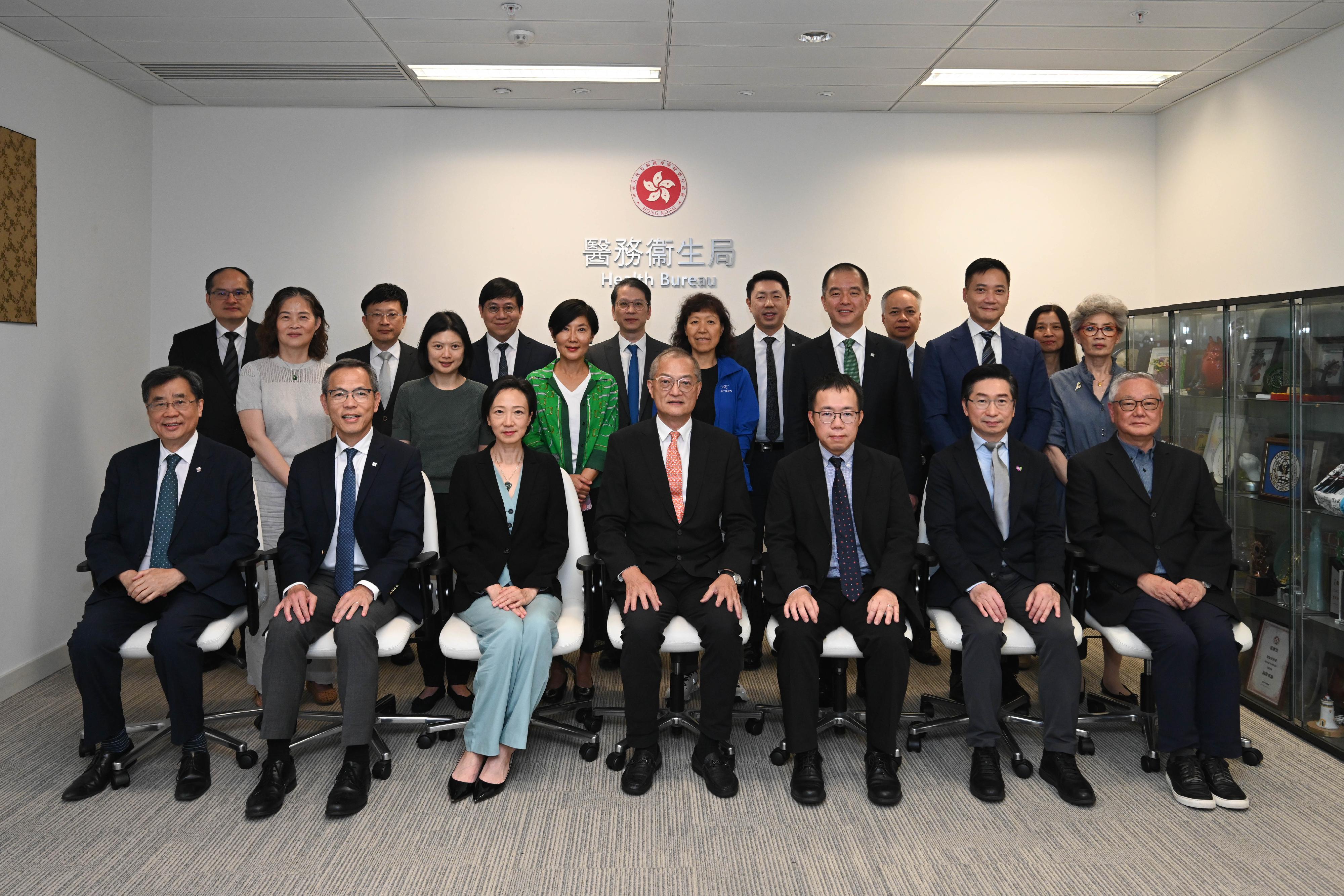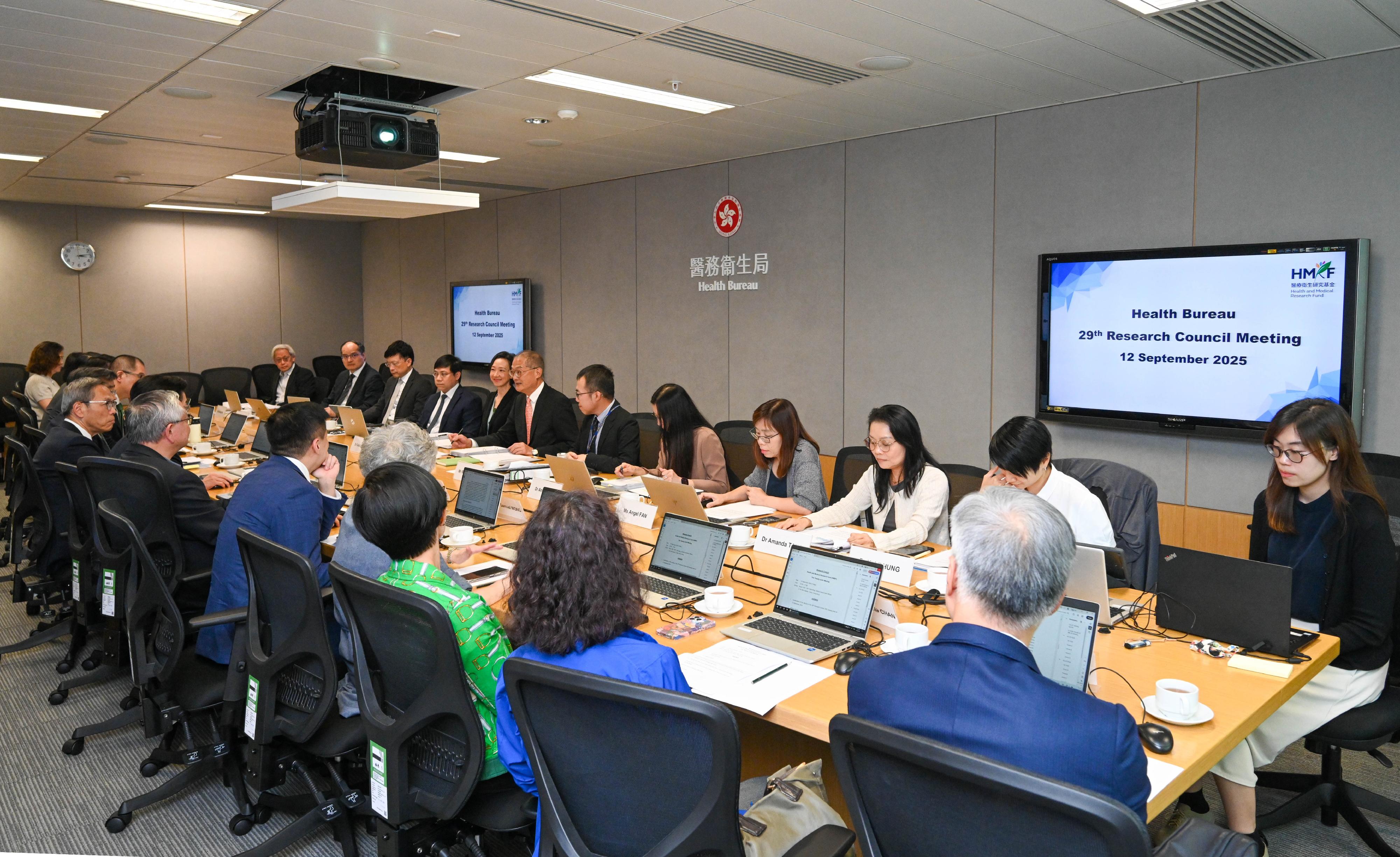Secretary for Health chairs 29th meeting of Research Council under Health Bureau (with photos)
******************************************************************************************
Professor Lo said, "If research findings can be successfully translated and truly applied, not only can they improve citizens' health and enhance public health standards, but also have the potential to develop into biopharmaceutical industry. This plays a pivotal role in addressing Hong Kong's increasingly complex health challenges."
He stressed, "The HMRF is committed to promoting research translation and supports projects with clear translation potential. I am glad to see that HMRF-funded research projects not only brought a positive influence on healthcare policies and practices, but also supported researchers in generating new knowledge in the biomedical and healthcare realm to promote medical advancement. In addition, a number of HMRF-funded projects have successfully secured additional funding for subsequent research, enabling further development and translation of their findings. These fruitful results demonstrate that the HMRF is highly effective in promoting the translation of academic research into practical applications. The Government will continue to foster scientific research and innovation in healthcare through the HMRF, as well as support high-quality scientific research and innovative projects that demonstrate clear translational potential. At the same time, the Government will also develop new quality productive forces in the field of health and medical research, including capabilities in clinical trials and new drug development, with a view to developing Hong Kong into an international health and medical innovation hub."
The RC was pleased to note the significant translation results and impacts of the HMRF-funded research, as revealed from the surveys conducted on 124 research projects in 2025. These include:
(i) Close to 70 per cent of the funded projects had their research findings published in peer-reviewed journals, showcasing that the HMRF is effective in supporting knowledge generation;
(ii) 40 per cent of the funded projects received additional funding support from the HMRF and other funding sources for subsequent research, with each project receiving an additional funding (excluding the HMRF) amounting to seven times that of the original HMRF grant on average;
(iii) Examples of applications in the formulation of healthcare policies and practices include:
(a) An HMRF-funded study found that an ortho-geriatric multidisciplinary care model for patients with fragility hip fractures led to better clinical outcomes, including shorter stays in acute and rehabilitation hospitals, less chest infections as complications, higher functional recovery at discharge, and improved system efficiency. This innovative service model has been widely adopted in the Hospital Authority (HA);
(b) Another HMRF-funded study evaluating the clinical efficacy and cost-effectiveness of online cognitive behavioural therapy to treat anxiety and depression has informed the development of digital mental health platform under the Jockey Club TourHeart+ Project (JCTH+). Relevant research findings became an integral part of the counselling services of eight local tertiary institutions to develop a stepped care system with online-offline hybrid interventions to support students; and
(c) An HMRF-funded cohort study found that specific serum biomarkers could improve risk prediction of liver cancer in chronic hepatitis B patients receiving antiviral treatment. These findings informed the "EASL Clinical Practice Guidelines on the Management of Hepatitis B Virus Infection" released by the European Association for the Study of the Liver (EASL) this year.
Moreover, over the past year, 25 HMRF-funded projects reported to have patent applications for further development, including commercialisation. These projects covered a wide variety of health issues, including novel drug candidates, gene therapies, new vaccine platforms and other emerging technologies. Notably, an HMRF-funded project validated a novel mechanism to identify fertilisation-competent sperms. These findings further informed another HMRF-funded project and led to the development of the world's first artificial intelligence model to accurately and efficiently assess sperm fertilisation capacity to support assisted reproduction treatments. The model won a Silver Award at the 50th International Exhibition of Inventions of Geneva this year.
At the meeting, the RC also endorsed the new research translation strategy of the HMRF. The strategy spans the entire research cycle and aims to further enhance the practical and translational value of HMRF-funded research. Over the past year, the HMRF consulted key stakeholders on the draft strategy, including academia, the public healthcare sector, healthcare professional bodies and community partners. The stakeholders expressed their support for the draft strategy and offered their views to make the new strategy more comprehensive. The new research translation strategy covers four priorities, namely: (i) to shape research translation culture; (ii) to build quality partnership; (iii) to promote end-of-grant translation; and (iv) to monitor and evaluate research outcomes.
During the meeting, the RC also considered the funding applications for investigator-initiated research projects under the HMRF received from last December to March this year and endorsed a funding commitment of $219 million involving 205 projects. The exact details will be released to the applicants in late September.
Professor Lo said, "With the growing breadth and depth of HMRF research, I encourage researchers to continue to make full use of the HMRF to accelerate the translation of their research outcomes, with a view to fostering medical innovation and supporting the implementation of evidence-based healthcare policies and practices to benefit the general public."
Chaired by the Secretary for Health, the RC comprises members including representatives and professors from two medical schools and healthcare-related disciplines of various universities as well as representatives from the Innovation, Technology and Industry Bureau, the Department of Health, the University Grants Committee and the HA. The RC provides strategic steer on funding for health and medical research and health promotion projects. It oversees the management of funds under the Health Bureau, including the HMRF, encompassing allocation of funding to approved projects.
Ends/Friday, September 12, 2025
Issued at HKT 17:45
Issued at HKT 17:45
NNNN






